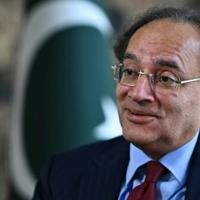Pakistan hopes to finalize the long-awaited privatization of its national airline and the outsourcing of Islamabad’s international airport by November, according to the country’s finance minister’s statement on Wednesday.
Muhammad Aurangzeb, who assumed office earlier this year, spoke to AFP at the World Bank’s headquarters in Washington while attending the annual meetings of the International Monetary Fund and the World Bank.
In a previous interview with AFP in April, Aurangzeb had expressed hope that the privatization of Pakistan International Airlines (PIA) could be completed by June 2024.
During his remarks on Wednesday, the finance minister attributed the five-month delay to ensuring macroeconomic stability and conducting thorough due diligence of interested parties.
“When foreign or local investors are looking to invest a substantial amount of money, they want to ensure a solid foundation is in place,” he stated, referring to macroeconomic factors.
Aurangzeb emphasized the importance of scrutinizing potential bidders for PIA and Islamabad airport, which was also a contributing factor to the delay.
“Therefore, the cabinet approved an extension in the timeline to allow for proper due diligence before submissions are made,” he explained.
– Brink of default –
Aurangzeb highlighted that Pakistan was behind on profit and dividend repayments when the current government assumed office, but steps have been taken to address this issue after making progress on macroeconomic stability.
The country faced the threat of default last year due to economic challenges following catastrophic floods and mismanagement, as well as a global economic downturn.
Inflation reached 38 percent but has since decreased to less than seven percent, thanks to measures such as maintaining high interest rates and government tightening measures to preserve foreign exchange reserves.
Last month, the IMF approved a $7 billion loan, marking Pakistan’s 24th payout from the lender since 1958.
Aurangzeb highlighted progress in reducing the country’s current account deficit and stabilizing the Pakistani rupee, which has depreciated significantly against the US dollar since 2020.
He mentioned that Pakistan’s gross public debt currently stands at 69 percent of GDP, approximately $258 billion according to the IMF.
– ‘Saturation point’ –
As part of the IMF deal, Pakistan is focused on privatizing state-owned enterprises, expanding its tax base, and reforming the power sector.
Aurangzeb stated that there is a common theme in these major issues: leakage, theft, and corruption that need to be addressed.
He dismissed claims that the government was not serious about broadening the tax base, citing a 29 percent increase in tax revenue in the last fiscal year and a targeted 40 percent increase in the current fiscal year.
With only 5.2 million people filing tax returns in a country with over 240 million inhabitants, Aurangzeb emphasized the need for more taxpayers to prevent reaching a saturation point with the current tax base.
The government is also committed to improving taxation in sectors such as real estate, retail, distributors, and agriculture.
da/aha





